The people you meet in prisons can change your life.
That’s what Bishop Kenneth Carder has learned during his 58 years of prison ministry. Bishop Carder has visited prisons since 1966 and had a personal friendship with a man on death row for 25 years. He calls prison visitation and public advocacy “an essential component of Christian discipleship.” However, his experiences in prisons took a new turn when his students at Duke Divinity School started to express interest in prison studies.
This year marks 15 years of transformative experiences intertwining prison and the academy at Duke Divinity School—Bishop Carder developed and taught the first prison course in the Duke Divinity School curriculum, “Restorative Justice, Prison Ministry, and the Church,” in 2009—but the dream for prison studies at Duke started years earlier with a few eager students.
The Growing Interest
In 2003, the M.Div. program at Duke Divinity School welcomed three new students—the Rev. Dr. Sarah Jobe, M.Div. ’06, the Rev. Jonathan Wilson-Hartgrove, M.Div. ’06, and the Rev. Isaac Villegas, M.Div. ’06.
After hearing about the prison studies opportunity at Vanderbilt Divinity School and how it had shaped their peers in Nashville, the three students sought similar opportunities at Duke and shared their interest with faculty. A little dream formed.
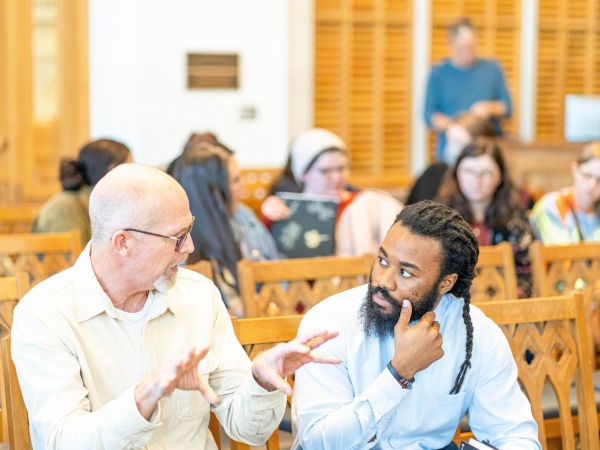
Without a prison program at Duke, the students carried on with other pursuits including completing their degrees and finding roles in church ministry and nonprofits. When Jobe found herself out of work in 2005, she circled back to the idea of prison ministry.
Both Wilson-Hartgrove and Jobe had spent a few hours in jail cells after civil rights protests, leading them to think: “You ought to have to go to jail as part of seminary education.” In as little as 24 hours, he got “a heck of an education about the criminal justice system’s impact on people’s lives,” said Wilson-Hartgrove.
With a little funding from Rutba House, an intentional Christian community near Duke’s East Campus founded by Wilson-Hartgrove and his wife that serves as a hospitality house, they began to work on a new idea: a prison studies group that would be open to both Duke Divinity School students and incarcerated people, creating an environment where they could study together and learn from each other.
They spent the next two years developing their concept; asking Duke Divinity faculty, including Bishop Carder, for advice; adapting to complicated logistics within the prison system; and shaping a theological vision that developed into a program called “Project TURN.” The acronym TURN—Transform, Unlock, Renew— was inspired by Romans 12:2 to “be transformed by the renewing of your mind.”
“It’s been the great honor of my life to get to over and over again take people into a space they are told not to go into and realize that the people we meet in prisons are people who are kind and bright and have faced incredibly difficult circumstances."
The Uphill Battle
The logistics to get inside of prisons are complicated. “It took us a few months for the Department of Adult Corrections to just talk to us about it,” says Jobe. It took even more time before they were welcomed into a facility.
Many hurdles made it hard to keep going in the early years, says Dr. Douglas Campbell, professor of New Testament and co-director of the prison studies program at Duke Divinity School with Jobe. They had to find the money for courses and books, coordinate travel for divinity students to the prison facilities, and deal with an abundance of clearance procedures. Not to mention, Campbell noted, that the Divinity School faculty were donating their time at first, teaching an additional class for free on top of their workload.
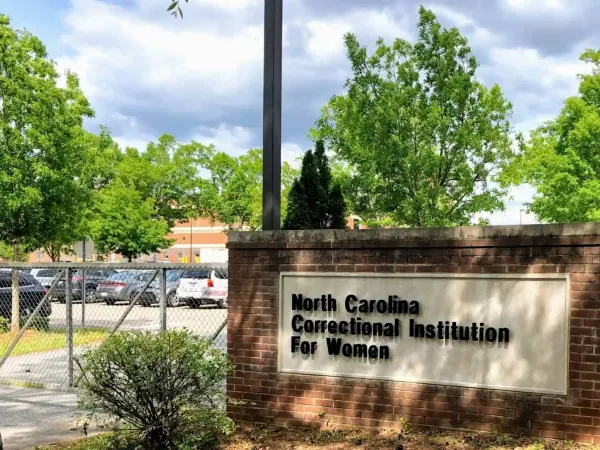
“The first facility that we were welcomed into was at the time called Raleigh Correctional Center for Women,” says Jobe, and the first Project TURN class took place inside that prison with five students from the Divinity School and five students from the prison.
“When I first walked into the space where they hold chapel and all educational courses, in a double-wide trailer, it just felt like I was home,” says Jobe. “At the time, I was just spending one night a week there for the class with Duke, but they were the nights I looked forward to the most.”
Jobe spoke about the memory with a quiet sincerity and gratitude: “I felt like there was an honesty that was permissible in that classroom. It was an invigorating learning environment. We’ve been running classes at the facility ever since, steadily for the whole 15 years. The first prison that invited us in.”
The Unjust System
In addition to the logistical challenges, prison work “has a number of difficult sides because it can be very emotional or triggering,” says Campbell. The work can be hard and draining, a refrain echoed by Bishop Carder and Jobe.
“Prisons are microcosms of the ills of society—racism, economic disparity, dysfunctional government, and inadequate education,” Carder says. “Faith communities have a vital role to play in transforming the criminal justice system from retribution to restorative.”
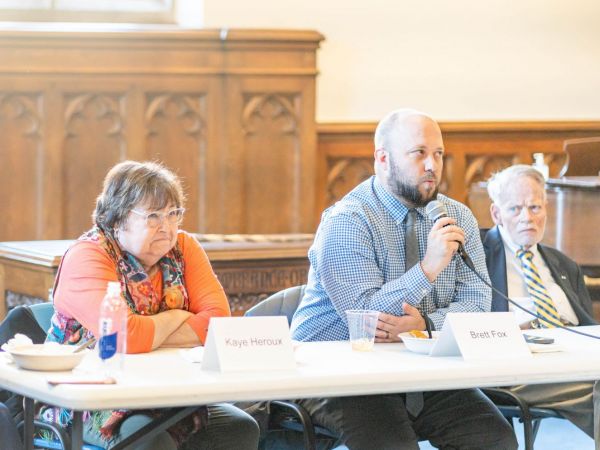
The prison system is “what we call justice” in the U.S. and it’s “how we respond to breaches of social contract,” says Jobe. “The criminal legal system in the U.S. is structured around the idea that some people are such a problem—so bad or so unsafe—to the rest of us that they literally need to be locked away from the rest of us. That ‘the rest of us’ are safer without relationship with people that we put behind bars.”
The people that we are told to think about when we think of prisons—sociopaths, serial killers—make up less than 1% of the incarcerated population, says Jobe. The system is built for those 500 instead of the millions of others that end up there. She wants students to take the time to think about those millions, to build relationships with them.
“It’s been the great honor of my life to get to over and over again take people into a space they are told not to go into and realize that the people we meet in prisons are people who are kind and bright and have faced incredibly difficult circumstances,” Jobe says.
The work is hard, but it’s worth it because it is so practical, so engaged, and so concrete, says Campbell. “You really see God at work. There is a sense that God is really there. It can be frustrating and hard, but very fulfilling.”
"The most rewarding thing for me was seeing the difference the course made in the theological perspectives and pastoral practices of the students. The experiences with incarcerated persons pushed students from an abstract theology to a lived theology.”
The Opening Door
When Bishop Carder began teaching “Restorative Justice, Prison Ministry, and the Church,” he had the vision to not just talk about prisons, but to have students go inside and meet the people there. He also wanted students to learn from practitioners and people with experience inside of prisons. “It was a revolutionary course,” says Campbell, with fondness and admiration for the bishop.
“I heard a prominent federal judge suggest that pastors should be as familiar with the inside of local jails and prisons as they are with local hospitals and nursing homes,” says Carder. “People who are incarcerated are means of grace, with experiences and gifts to offer society and the church. Other than the challenge of navigating the bureaucratic maze of entering the prison, helping students to see prison ministry as ministry with not to was a challenge, helping them see the incarcerated persons as mutual participants in God's mission rather than objects of ministry.”

Students cherish the learning environment—the togetherness—more than they ever would expect, says Jobe. “It offers a unique kind of learning, getting to be friends and fellow students with people that the world would otherwise separate you from. I don’t think it’s something that the divinity students could learn in the same way on Duke campus, but they learn it in the first 30 minutes of being in a prison.”
The divinity students have to relocate their bodies and physically enter the prison. They discuss theological ideas with people in a radically different current social location. “They are hearing truly different perspectives than what they are hearing with a group of people who all presume freedom,” Jobe says. The incarcerated students “cherish those classes because it is an opportunity to be with non-incarnated people and to be treated as if they are a ‘free-world’ student, engaging in graduate studies.”
Over time, the program has become more formal and structured, with a Certificate in Prison Studies offered to Duke Divinity students as well as a Certificate of Theology that can be earned by incarcerated students. Professors can incorporate their work for prison courses into their formal research and teaching plans. And the program has received increased funding from the school over the past 15 years.
“It’s by those formal institutional support avenues that prison and academy get knit closer together,” Jobe says. “The formal pathways lead the door between prison and academy to become an actual, open doorway instead of a small crack that no one can get through.”
The Shifting Theological Perspective
Guiding students into prison work after seminary is not Jobe’s goal. Rather, she wants to see them go into their careers being different pastors, social workers, and educators then they would have been without these courses.
She sees students “who can never again buy into this social script with ease that prisons are an answer instead of a problem.” For many students, their whole perspective on prisons, people in prisons, and the biblical prison texts shift because of the program.
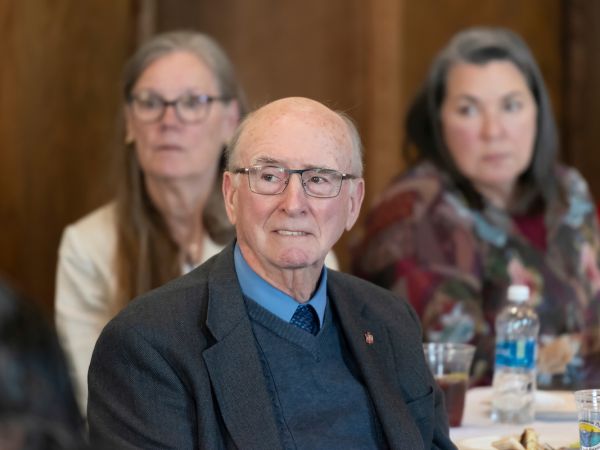
Bishop Carder echoed this idea: “The most rewarding thing for me was seeing the difference the course made in the theological perspectives and pastoral practices of the students. The experiences with incarcerated persons pushed students from an abstract theology to a lived theology.”
The courses offered in the prison studies program push students out of the comfort of abstractions. In the “Philippians and Philemon” course, taught by the Rev. Dr. Ross Wagner, associate professor of New Testament, students get a very different perspective on the texts that were written in prisons when they study them from inside prison walls.
“Instead of spiritualizing all of the prison language, we actually talk about what it feels like to be handcuffed, to have limited freedom, to have limited mobility, to be inside of solitary confinement versus gen pop versus Duke Divinity School. Students are confronted with the text in different ways when it is relocated,” Jobe says.
It wasn’t until teaching “Prison in the Bible” that Jobe realized just how much Jesus was an incarcerated person—Jesus went through an arrest, trial, and an execution. “In some ways it’s right there on the surface, but in other ways we are taught to read it without naming it,” says Jobe.
The prison context even shifted her view of the resurrection: it became a release from prison, a release from state-sponsored execution.
“The resurrection says state-sponsored execution does not get the last word. Your criminal sentence does not get the last word. There is life after prison and life after the grave. When Jesus has his resurrection appearances, those are his first days being free. Those are all things that I realized and saw for the first time by studying those biblical texts inside of a prison. I’m not sure I would have learned it otherwise.”
“I had to stop running from God and accept my call and purpose. Never in a million years did I ever think about attending Duke University. And to be able to finally accept my purpose and be granted such a wonderful opportunity, is only a gift that can be orchestrated by God! It is never too late to walk in your call."
The 15th Year of Prison Studies at Duke Divinity
The Rev. Dr. Lauren Winner, associate professor of Christian spirituality, teaches the “Carceral Saints” course, which examines saints with criminal records, arrests, trials, and time in jail or prisons. Jobe notes that many faithful, historic martyrs committed crimes, some for the sake of their religion—but not always! Some saints were imprisoned for violent crimes or bar brawls. “Then one day, they lived their life big for God,” she adds. “Because God can use people’s natural beings, proclivities, and personalities without changing them, just tuning them to work for God.”
The prison studies program acknowledged such carceral saints recently, in a special service to celebrate 15 years of the program at the Divinity School. Jobe preached on Paul’s letter to the Philippians, written from prison, and on Epaphroditus—the person on the outside who came to visit Paul in prison.
The church at Philippi sent Epaphroditus to take care of Paul’s needs, says Jobe. “They don’t forget him. They communicate with him. They show him that he’s remembered and he’s still an important part of the community. Paul situates what he is doing, being in prison, and what the Philippians are doing, supporting him during his incarceration, inside the person of Christ. This is where we get the Christ Hymn.”

Your mind should be the same as Christ Jesus, who, being in the very nature of God, did not consider equality with God something to be grasped, but made himself nothing, emptied himself, taking on the very nature, or being of a servant of a slave. (Philippians 2:5–8)
Paul gives human examples, people like-minded to Christ, pointing to Epaphroditus. “You can put on the mind of the executed Christ by choosing to draw near to prison,” says Jobe.
During the service in Goodson Chapel, a drawing of Epaphroditus by Gracie Moore Bitzer was on display. Jobe noted that very little art throughout history has featured Epaphroditus.
“If you choose to hang around prisons, it's not going to make a name for yourself. We don't have images around him. We're not quite sure what he's the saint of, but I tell you this: I've come to know him as the patron saint of those who hang around in prisons. I've come to think of him as the saint for this program. For people who go to prison by choice instead of by force.”
With tears welling in her eyes, during the service Jobe addressed everyone involved in the prison program: “Epaphroditus is a living sacrifice. As are you. A living sacrifice pleasing and acceptable in God’s sight. It’s a mystery that you can walk in prisons and be an icon of the convicted, executed, and exonerated Christ—but I have watched you do it for 15 years. Watched you become icons of an executed God.”
Featured Students and Alumni

Shirlye Grandy

Meredith Manchester

Cari Willis
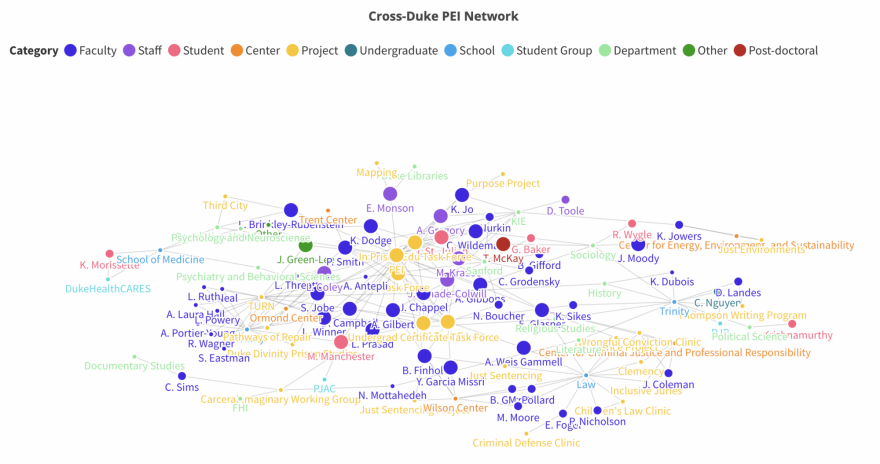
The Prison Engagement Initiative
Sarah Jobe says one of the things that’s been lovely, but also frustrating, about the prison studies program is that there has been interest from faculty across the entire university to teach in the program but the possible subject matter was limited in a program hosted solely by the Divinity School. A new little dream formed, just like all of those years ago.
Jobe and Douglas Campbell formed the Prison Engagement Initiative in the Kenan Institute for Ethics at Duke University with the intent of bringing together faculty, staff, students, and community members seeking to engage prisons and the people affected by prisons in their work.
Faculty across the entire university have been involved, and the Prison Engagement Initiative continues to expand its reach and goals. At the end of 2023, the initiative launched tasks forces to focus on how Duke engages prisons and the criminal legal system, one of which is the creation of a consortium of colleges and universities in the Piedmont region of North Carolina to offer a B.A. degree program to incarcerated students.
Prison Studies at Duke Divinity
Duke Divinity School's engagement in prison studies includes courses taught to both Divinity students and incarcerated students, a Certificate in Prison Studies offered to Divinity students, a certificate offered to incarcerated students, the Prison Justice Action Committee student group, and events hosted throughout the year.
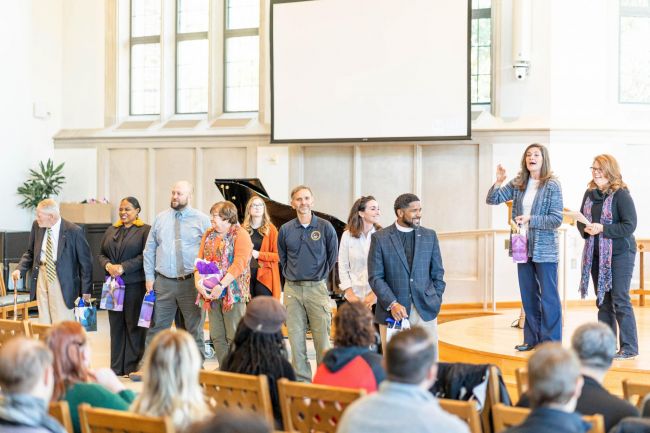
Sarah Jobe presents gifts to leaders in the Prison Studies program.
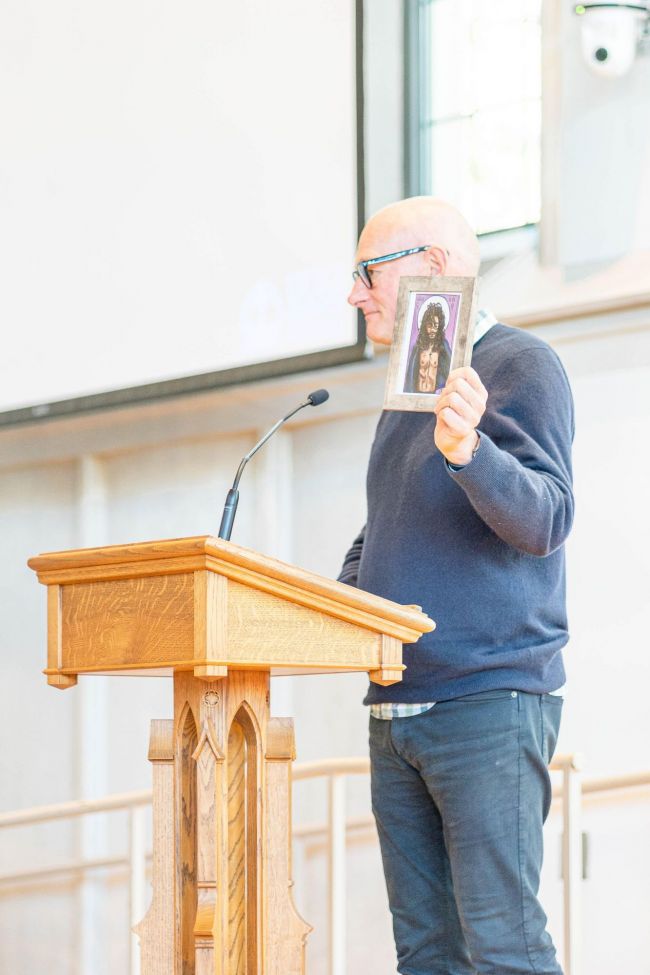
Douglas Campbell speaks at the Prison Justice Action Committee service.
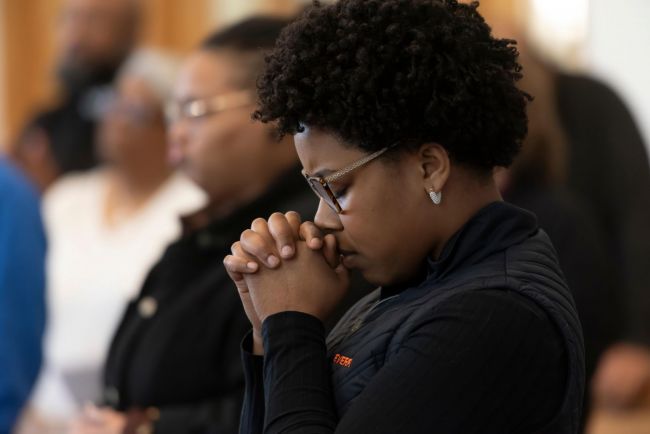
Student prays at the 15th Anniversary of the Prison Studies program.
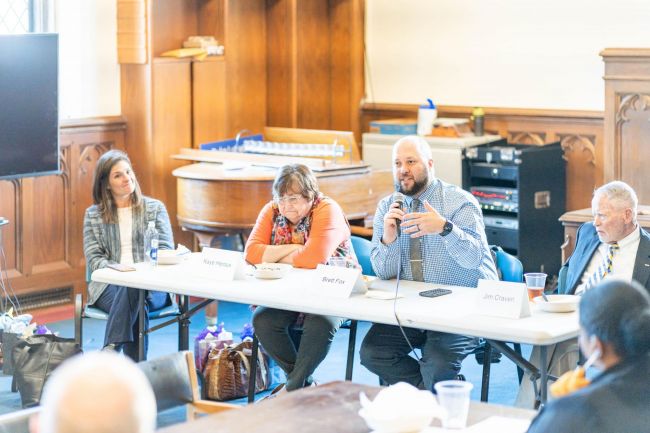
A panel member speaks at a Prison Justice Action Committee event.
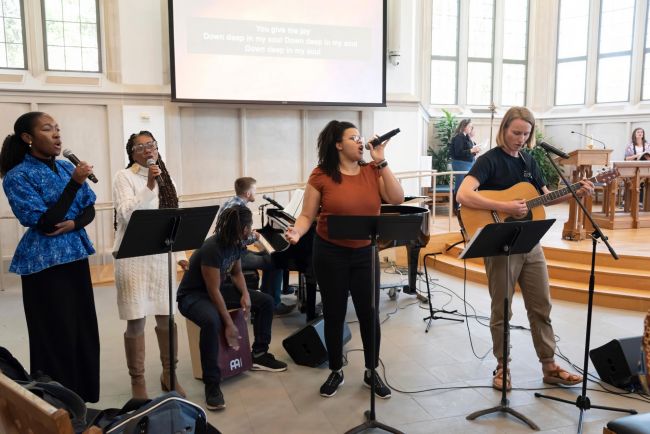
Chapel band plays at the 15th Anniversary of the Prison Studies program.
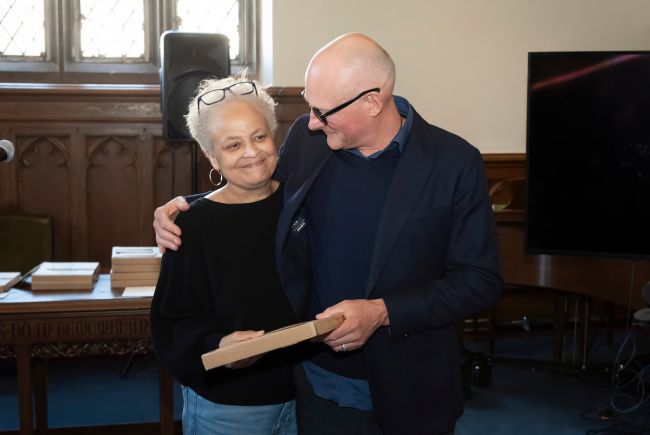
Shirlye Grandy and Douglas Campbell at the 15th Anniversary of the Prison Studies program.
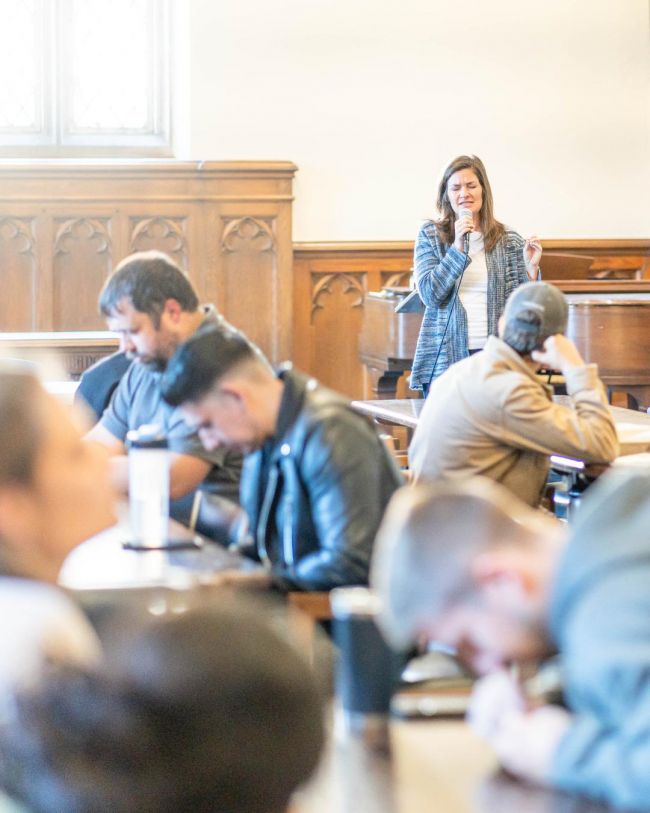
Sarah Jobe prays with Divinity Students at a Prison Studies event.
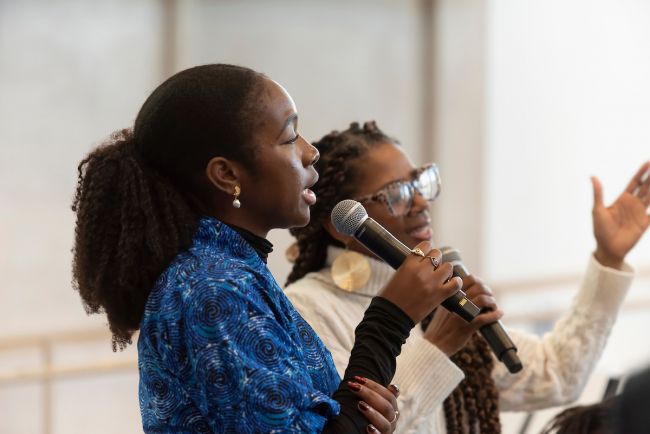
Students lead worship at the 15th Anniversary of the Prison Studies program.
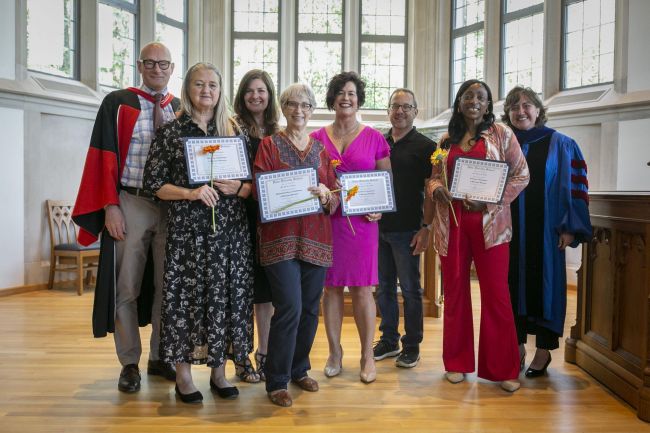
Students in the Prison Studies program receiving certificates.
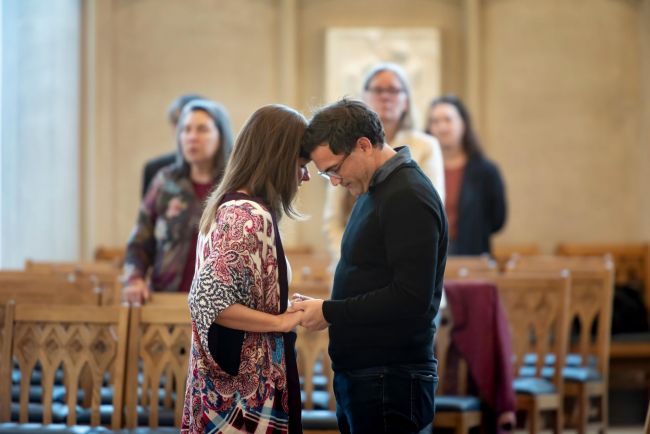
Sarah Jobe praying with participants at the 15th Anniversary of the Prison Studies program.